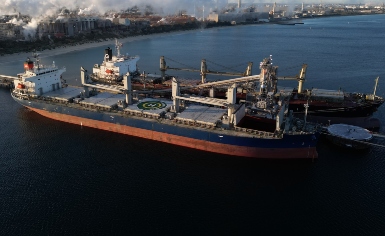
Britannia P&I Club warns against the risks of cargo fumigation and presents steps people onboard can take in order to mitigate those risks.
Fumigation is an effective approach to eradicate living organisms, such as insects or rodents, and is used to mitigate the transmission of invasive species or phytosanitary risks when transporting an agricultural cargo from one port to another.
Cargo fumigation risks
Both methyl bromide and aluminum phosphide, chemicals used for fumigation, Continue reading “Cargo fumigation: An overview for the maritime sector”

 This overview of cargo claims has been provided by The Swedish Club. The Swedish Club has released a detailed analysis of grains and soya beans cargo claims review having reviewed 200 bulk carrier claims. To be included in the statistics the claims had to have generated a cost of at least $5,000 and have been made between 2018 and 2022.
This overview of cargo claims has been provided by The Swedish Club. The Swedish Club has released a detailed analysis of grains and soya beans cargo claims review having reviewed 200 bulk carrier claims. To be included in the statistics the claims had to have generated a cost of at least $5,000 and have been made between 2018 and 2022.
 Mark Russell, Vice President, Head of Cargo Claims,
Mark Russell, Vice President, Head of Cargo Claims,  The London P&I Club has continued to see cargo damage claims arising from the carriage of dry chemicals in Flexible Intermediate Bulk Containers (FIBCs), more commonly known as “jumbo bags”, which have been stowed in the same holds as breakbulk cargoes. FIBCs have a body of a flexible woven material (typically polypropylene) and is intended for shipping solid materials in powder, flake or granular form.
The London P&I Club has continued to see cargo damage claims arising from the carriage of dry chemicals in Flexible Intermediate Bulk Containers (FIBCs), more commonly known as “jumbo bags”, which have been stowed in the same holds as breakbulk cargoes. FIBCs have a body of a flexible woven material (typically polypropylene) and is intended for shipping solid materials in powder, flake or granular form. A new video has been released by
A new video has been released by 

 The Loss Prevention team at the UK P&I Club has produced its latest ‘Inside Ship’ animated training video, focused on correctly securing fasteners to prevent equipment failures during an overhaul.
The Loss Prevention team at the UK P&I Club has produced its latest ‘Inside Ship’ animated training video, focused on correctly securing fasteners to prevent equipment failures during an overhaul. In recent years,
In recent years, 